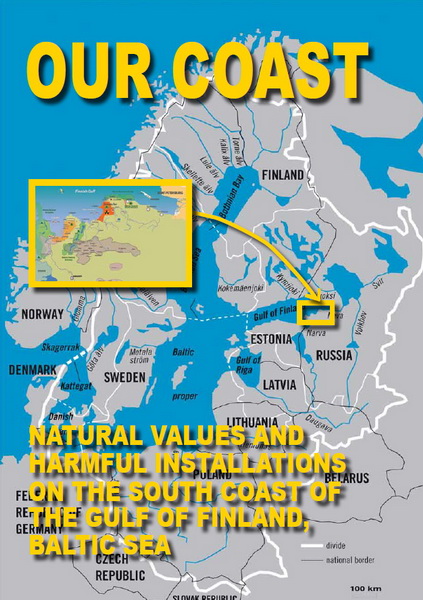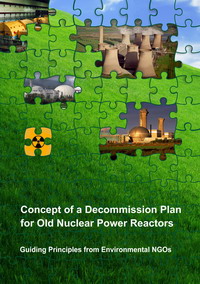
 |
The South Coast of the Gulf of Finland |
|---|---|
| Natural Values and Harmful Installations |
 |
Concept of a decommission plan for old nuclear power reactors |
|---|---|
| Guiding Principles from Environmental NGOs |
New Russian law on radioactive waste management. Comments and history
In 2008, Rosatom Federal Atomic Energy Agency promulgated the bill On Radioactive Waste Management. This is one of the first attempts on the part of the agency of state administration to organize a broad discussion of an important law in the field of nuclear energy use.
Under the current legislation the sphere of radioactive waste management is not properly regulated. The Russian legal system has no specific law regulating the relations in this sphere.
Attempts to create a comprehensive legislative act which would regulate radioactive waste management in Russia have been made since 1992. In 1995, a draft federal law On the State Policy in the Sphere of Radioactive Waste Management was developed; however, the Council of Federation of the Federal Assembly of the Russian Federation by its decision rejected the specified bill. A Conciliation Committee was established, V.N. Rastorguev and Ya.N. Shoyhet became the members of the Committee on behalf of the Council of Federation of the Federal Assembly of the Russian Federation. After certain amendments have been made to that bill, its name changed to the following: On Radioactive Waste Management. This wording was adopted by two chambers of Federal Assembly of the Russian Federation and was submitted for signature to the President of the Russian Federation. However, Russian President dismissed the bill and sent it for revision. As a result, in 2001, the specified bill was excluded from further consideration by the State Duma of the Russian Federation.
The new bill is drastically different from the previous versions. The main provisions are as follows.
The bill proposes to expand the system of radioactive waste (hereinafter - RW) categorization. These substances are classified into different types based on their physical condition, technological properties, hazard level, etc. Among the criteria of discrimination the authors of the bill distinguish such as formation time and state responsibility. It is proposed to divide all RW into accumulated and operational radioactive waste (Article 2 of the bill).
The first group includes:
- radioactive waste generated as a result of the defense and civil programs in the territory of the Russian Federation before the law entered into force;
- radioactive waste generated during decommissioning of the shut-down nuclear facilities, in case if the financing of the decommissioning of these facilities is not provided with appropriate special fund;
- radioactive waste generated in result of management of the spent nuclear fuel, accumulated to a certain moment of time, defined by regulatory legal acts of the Russian Federation;
- radioactive waste generated in result of management of the accumulated radioactive waste (secondary radioactive waste).
All financial responsibility for handling the accumulated RW in accordance with the provisions of the bill shall be born by the state (Article 23 of the Bill).
Thus, almost all existing in the Russian Federation RW are accumulated and management of the same must be carried out at the expense of taxpayers.
Operational RW include waste which will be generated in future after the law enters into force and sufficient financial means are accumulated for their safe management. Notably, this moment of time is not clearly defined by the bill and will be established in future by the Government of the Russian Federation (par.5 Article 33 of the bill).
The bill contains the idea of realization of ultimate disposal principle. Therewith, ultimate disposal of long-life high-level radioactive waste in deep geological formations is intended (Article 30 of the bill).
Ultimate disposal of middle-level and low-level radioactive waste may be carried out at final isolation (dumping) facilities of near surface type.
The bill contains almost no prohibitive categories as for instance in the federal law On the Protection of the Environment (where the express prohibition against RW dumping in natural environment components is established). Thus, the bill presents the principle of recommendations for RW management at all stages of the management process. For example, it states that the management methods, including ultimate isolation (dumping), for radioactive waste liquid and radioactive waste gas should be selected taking into account economic and technological peculiarities and indexes and should ensure that environmental and radiological impact on people and environment at all stages of the waste management is as low as practicable, including cases associated with the need for technological conditions of operation and decommissioning of facilities, which had been put into service prior to the law entered into force and are of particular importance to the state and defense purposes (Article 30 of the bill).
Thus, one can conclude that the authors of the bill offer to legalize the existing storage facilities of liquid and solid RW in the subsurface at such enterprises as Siberian Chemical Industrial Complex (Tomsk) and Mining-Chemical Complex (Zheleznogorsk).
Organization of radwaste management, in accordance with the bill, stipulates the establishment of a unified system of radwaste management, the main objects of which is the agency of state administration in the field of RW management (Rosatom State Corporation), regulatory agencies, national operator of RW management, specialized organizations and operating organizations-RW producers. In this connection, all issues of administration of the radwaste management system are expected to be entrusted to Rosatom.
While all financial responsibility for radioactive waste management rests on the state, the bill does not contain any provisions for additional budget expenditures apart from funds provided for the same by the Federal Targeted Program On Nuclear and Radiation Safety Assurance for 2008 and through 2015” (approved by the Decree No.444 issued by the Government of the Russian Federation dated of July 13, 2007) and other targeted programs that make provisions for radioactive waste management activities. This provision is envisaged in financial and economic justification to the bill. It should be noted that the above program has not been officially published so far and is classified as restricted publication.
In summary of incomplete analysis of the bill On Radioactive Waste Management the following conclusions can be made.
The bill fails to give clear general concept of RW management. Spent nuclear fuel is factored out of the legal regulation which prevents from formulating the common rules for RW and spent nuclear fuel management as it is accomplished in the international law (The Joint Convention on the Safety of Spent Fuel Management and on the Safety of Radioactive Waste Management, Vienna, 1997) and in the national laws of many countries. To achieve a comprehensive legal regulation it is necessary either to include the spent nuclear fuel into the scope of operation of law on radioactive waste management or to consider two separate bills simultaneously: on radioactive waste management and spent nuclear fuel management.
The bill includes no provisions for regulation of relationships on export and import of radioactive waste, spent nuclear fuel and RW generated from the foreign nuclear-fuel reprocessing, although the current laws contain some uncertainty in this matter. This uncertainty affords opportunity to leave the waste generated in result of reprocessing of nuclear-fuel, nuclear material and radioactive substances in the territory of the Russian Federation, or to store the foreign spent nuclear fuel for a long time.
In the event the bill is adopted in the wording under consideration, it will entail the need for change of environmental regulations, as far as some rules of radioactive waste management, set forth in the bill, are inconsistent with the environmental regulations. Therefore, according to the par.2 of the Article 4 of the bill, federal laws and other regulatory legal acts of the Russian Federation, as well as laws and other regulatory legal acts of the entities of the Russian Federation containing norms regulating relations in the sphere of radioactive waste management, may not be contrary to the law.
Furthermore, in accordance with the Article 34 of the bill, regulatory legal acts, which were adopted before the law entered into force and establish requirements to radioactive waste management, shall be applied to the extent that does not contravene this law.
In the same way, the provisions of the Article 51 of the Law On the Protection of the Environment, prohibiting radioactive waste discharge and disposal of the same in the subsurface, will be amended. Similar amendments will be applicable to the Water Code of the Russian Federation.
The bill is controversial. On the one hand, according to the Article 8 one of the principles of establishment and functioning of the unified state system of radioactive waste management is an absolute priority to the protection of human life and health of the current and future generations, biological resources and environment against the harmful effects of radioactive waste during performance of activity in the filed of nuclear energy use. On the other hand, the possibility of radwaste dumping in natural environment components is assumed.
Many provisions of the bill are of blanket character, to implement this bill a large number of by-laws need to be developed which would define the important provisions. Without these legal mechanisms the law shall not be effective.
The bill fails to set out the procedures for public participation at different stages of radioactive waste management, though the right of citizens and public associations to participate in the formation process of the policy of nuclear energy use is set forth in the Article 14 of the Federal Law On the Use of Nuclear Energy.
With due regard for the above issues, the bill needs serious revision, its adoption in the existing wording which is isolated from the legal regulation of the whole complex of relations in the field of regulating the radioactive waste and spent nuclear fuel management, shall not contribute to the protection of the present and future generations from the harmful effects on their health of ionization radiation.
Andrey Talevlin, lower,
“For Nature” foundation Chairperson, Chelyabinsk


